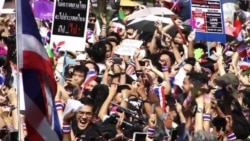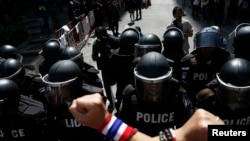BANGKOK —
Thai protesters briefly stormed into army headquarters in Bangkok in a bid to get the military to join their efforts to topple the government of Prime Minister Yingluck Shinawatra.
More than 1,000 opposition supporters left the compound peacefully after about two hours. Army Commander General Prayuth Chan-ocha later urged protesters not to force the army to take sides.
Opposition leaders say Sunday will be their "victory day" and have called for supporters to besiege the prime minister's office. They vow to take over every ministry until the prime ministers resigns.
Security forces this week have not intervened to bar the demonstrators from seizing government buildings and camping out in front of them.
On Thursday, Yingluck easily survived a parliamentary no-confidence vote. But she and her brother, former prime minister Thaksin Shinawatra, remains a magnet for controversy.
Many protestors believe Thaksin still runs things here despite the billionaire’s ouster in a 2006 military coup. In self-imposed exile, he faces jail time for corruption convictions should he return home. So far, the military, which has staged 18 coups since the end of absolute monarchy in 1932, is showing no sign of intervening.
In front of the U.S. Embassy Friday, former finance minister Korn Chatikavanji spoke to protestors as a letter was delivered to the American mission asserting the prime minister’s lack of legitimacy to lead.
Korn, atop a loudspeaker truck, shouts that they have come to tell the American people what they are doing and all gathered here agree with the contents of the submitted letter.
The U.S. State Department has referred to the seizure of property and the potential of violence here as “not acceptable means of resolving political differences.”
Among the thousands joining the protest in front of the embassy, life insurance company employee Patthanapong Yamngarmlua.
“We don't like this government. We need them to get out of this country," said Patthanapong. "And, of course, including their family, also.”
Yingluck has been prime minister since her PueaThai party’s landslide election victory in 2011.
At the forefront of the opposition to her and her brother is former deputy prime minister Suthep Thaugsuban.
He wants a “people’s council” established to select a new prime minister and enhancing the power of the monarchy, headed by the country’s ailing 85-year-old King Bhumibol Adulyadej.
A travel agency employee, identifying herself only as Sivaporn, agrees with those goals.
She says she does not know whether the movement will lead to change but everyone is giving their utmost every day and that is the best they can do.
While the anti-government demonstrations resemble more of a festival than a revolution, there are concerns that the mood could quickly change.
More than 1,000 opposition supporters left the compound peacefully after about two hours. Army Commander General Prayuth Chan-ocha later urged protesters not to force the army to take sides.
Opposition leaders say Sunday will be their "victory day" and have called for supporters to besiege the prime minister's office. They vow to take over every ministry until the prime ministers resigns.
Security forces this week have not intervened to bar the demonstrators from seizing government buildings and camping out in front of them.
On Thursday, Yingluck easily survived a parliamentary no-confidence vote. But she and her brother, former prime minister Thaksin Shinawatra, remains a magnet for controversy.
Many protestors believe Thaksin still runs things here despite the billionaire’s ouster in a 2006 military coup. In self-imposed exile, he faces jail time for corruption convictions should he return home. So far, the military, which has staged 18 coups since the end of absolute monarchy in 1932, is showing no sign of intervening.
In front of the U.S. Embassy Friday, former finance minister Korn Chatikavanji spoke to protestors as a letter was delivered to the American mission asserting the prime minister’s lack of legitimacy to lead.
Korn, atop a loudspeaker truck, shouts that they have come to tell the American people what they are doing and all gathered here agree with the contents of the submitted letter.
The U.S. State Department has referred to the seizure of property and the potential of violence here as “not acceptable means of resolving political differences.”
Among the thousands joining the protest in front of the embassy, life insurance company employee Patthanapong Yamngarmlua.
“We don't like this government. We need them to get out of this country," said Patthanapong. "And, of course, including their family, also.”
Yingluck has been prime minister since her PueaThai party’s landslide election victory in 2011.
At the forefront of the opposition to her and her brother is former deputy prime minister Suthep Thaugsuban.
He wants a “people’s council” established to select a new prime minister and enhancing the power of the monarchy, headed by the country’s ailing 85-year-old King Bhumibol Adulyadej.
A travel agency employee, identifying herself only as Sivaporn, agrees with those goals.
She says she does not know whether the movement will lead to change but everyone is giving their utmost every day and that is the best they can do.
While the anti-government demonstrations resemble more of a festival than a revolution, there are concerns that the mood could quickly change.








